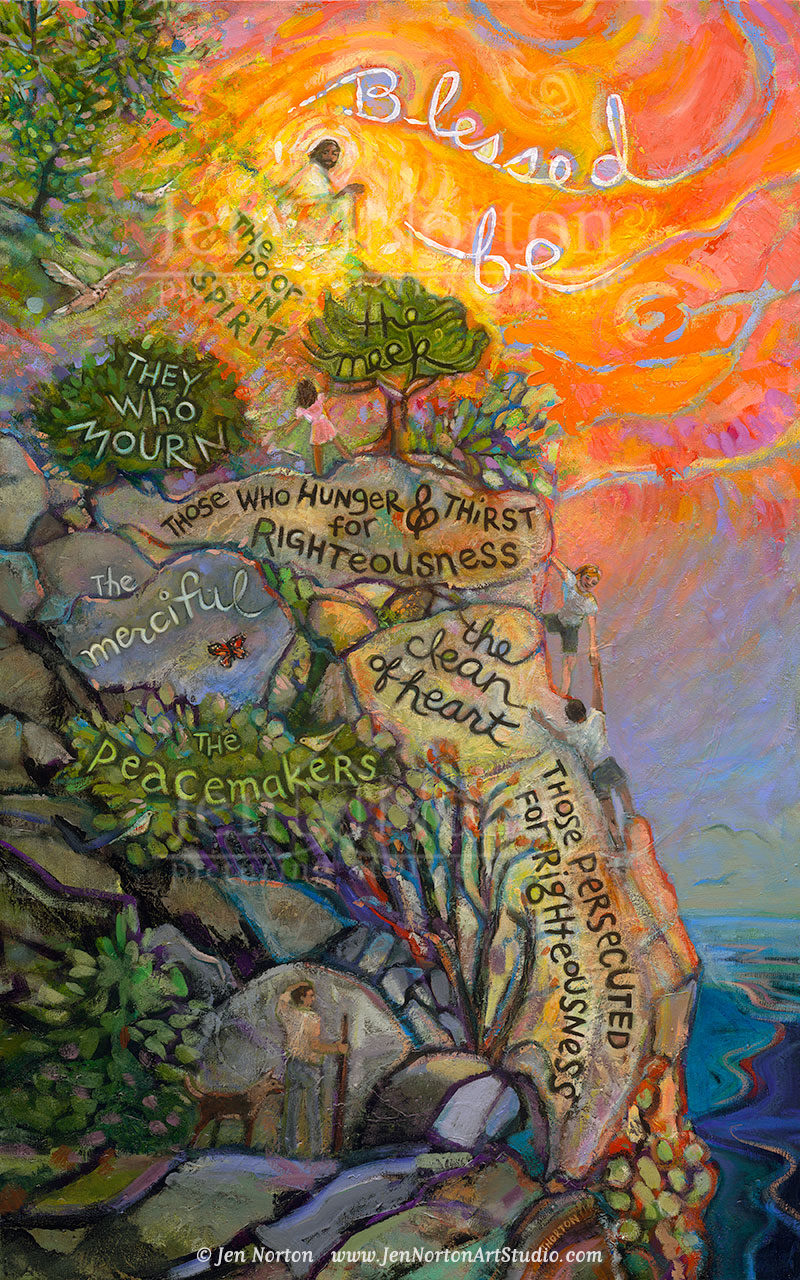Joel 2:1-2, 12-17
Blow the trumpet in Zion; sound the alarm on my holy mountain! Let all the inhabitants of the land tremble, for the day of the Lord is coming, it is near— a day of darkness and gloom, a day of clouds and thick darkness! Like blackness spread upon the mountains a great and powerful army comes; their like has never been from of old, nor will be again after them in ages to come.Yet even now, says the Lord, return to me with all your heart, with fasting, with weeping, and with mourning; rend your hearts and not your clothing. Return to the Lord, your God, for he is gracious and merciful, slow to anger, and abounding in steadfast love, and relents from punishing. Who knows whether he will not turn and relent, and leave a blessing behind him, a grain offering and a drink offering for the Lord, your God? Blow the trumpet in Zion; sanctify a fast; call a solemn assembly; gather the people. Sanctify the congregation; assemble the aged; gather the children, even infants at the breast. Let the bridegroom leave his room, and the bride her canopy. Between the vestibule and the altar let the priests, the ministers of the Lord, weep. Let them say, “Spare your people, O Lord, and do not make your heritage a mockery, a byword among the nations. Why should it be said among the peoples, ‘Where is their God?’”
Isaiah 58:1-12
Shout out, do not hold back! Lift up your voice like a trumpet! Announce to my people their rebellion, to the house of Jacob their sins. Yet day after day they seek me and delight to know my ways, as if they were a nation that practiced righteousness and did not forsake the ordinance of their God; they ask of me righteous judgments, they delight to draw near to God.
“Why do we fast, but you do not see? Why humble ourselves, but you do not notice?” Look, you serve your own interest on your fast day, and oppress all your workers. Look, you fast only to quarrel and to fight and to strike with a wicked fist. Such fasting as you do today will not make your voice heard on high. Is such the fast that I choose, a day to humble oneself? Is it to bow down the head like a bulrush, and to lie in sackcloth and ashes? Will you call this a fast, a day acceptable to the Lord? Is not this the fast that I choose: to loose the bonds of injustice, to undo the thongs of the yoke, to let the oppressed go free, and to break every yoke? Is it not to share your bread with the hungry, and bring the homeless poor into your house; when you see the naked, to cover them, and not to hide yourself from your own kin?
Then your light shall break forth like the dawn, and your healing shall spring up quickly; your vindicator shall go before you, the glory of the Lord shall be your rear guard. Then you shall call, and the Lord will answer; you shall cry for help, and he will say, Here I am. If you remove the yoke from among you, the pointing of the finger, the speaking of evil, if you offer your food to the hungry and satisfy the needs of the afflicted, then your light shall rise in the darkness and your gloom be like the noonday. The Lord will guide you continually, and satisfy your needs in parched places, and make your bones strong; and you shall be like a watered garden, like a spring of water, whose waters never fail. Your ancient ruins shall be rebuilt; you shall raise up the foundations of many generations; you shall be called the repairer of the breach, the restorer of streets to live in.
Psalm 51
Have mercy on me, O God, according to your steadfast love; according to your abundant mercy blot out my transgressions.Wash me thoroughly from my iniquity, and cleanse me from my sin.
For I know my transgressions, and my sin is ever before me.
Against you, you alone, have I sinned, and done what is evil in your sight, so that you are justified in your sentence and blameless when you pass judgment.
Indeed, I was born guilty, a sinner when my mother conceived me.
You desire truth in the inward being; therefore teach me wisdom in my secret heart.
Purge me with hyssop, and I shall be clean; wash me, and I shall be whiter than snow.
Let me hear joy and gladness; let the bones that you have crushed rejoice.
Hide your face from my sins, and blot out all my iniquities.
Create in me a clean heart, O God, and put a new and right spirit within me.
Do not cast me away from your presence, and do not take your holy spirit from me.
Restore to me the joy of your salvation, and sustain in me a willing spirit.
Then I will teach transgressors your ways, and sinners will return to you.
Deliver me from bloodshed, O God, O God of my salvation, and my tongue will sing aloud of your deliverance.
O Lord, open my lips, and my mouth will declare your praise.
For you have no delight in sacrifice; if I were to give a burnt offering, you would not be pleased.
The sacrifice acceptable to God is a broken spirit; a broken and contrite heart, O God, you will not despise.
2 Corinthians 5:20b - 6:10
...we entreat you on behalf of Christ, be reconciled to God. For our sake he made him to be sin who knew no sin, so that in him we might become the righteousness of God.
As we work together with him, we urge you also not to accept the grace of God in vain. For he says, “At an acceptable time I have listened to you, and on a day of salvation I have helped you.” See, now is the acceptable time; see, now is the day of salvation! We are putting no obstacle in anyone’s way, so that no fault may be found with our ministry, but as servants of God we have commended ourselves in every way: through great endurance, in afflictions, hardships, calamities, beatings, imprisonments, riots, labors, sleepless nights, hunger; by purity, knowledge, patience, kindness, holiness of spirit, genuine love, truthful speech, and the power of God; with the weapons of righteousness for the right hand and for the left; in honor and dishonor, in ill repute and good repute. We are treated as impostors, and yet are true; as unknown, and yet are well known; as dying, and see—we are alive; as punished, and yet not killed; as sorrowful, yet always rejoicing; as poor, yet making many rich; as having nothing, and yet possessing everything.
Matthew 6:1-6, 16-21
“Beware of practicing your piety before others in order to be seen by them; for then you have no reward from your Father in heaven. “So whenever you give alms, do not sound a trumpet before you, as the hypocrites do in the synagogues and in the streets, so that they may be praised by others. Truly I tell you, they have received their reward. But when you give alms, do not let your left hand know what your right hand is doing, so that your alms may be done in secret; and your Father who sees in secret will reward you.
“And whenever you pray, do not be like the hypocrites; for they love to stand and pray in the synagogues and at the street corners, so that they may be seen by others. Truly I tell you, they have received their reward. But whenever you pray, go into your room and shut the door and pray to your Father who is in secret; and your Father who sees in secret will reward you.
“And whenever you fast, do not look dismal, like the hypocrites, for they disfigure their faces so as to show others that they are fasting. Truly I tell you, they have received their reward. But when you fast, put oil on your head and wash your face, so that your fasting may be seen not by others but by your Father who is in secret; and your Father who sees in secret will reward you.
“Do not store up for yourselves treasures on earth, where moth and rust consume and where thieves break in and steal; but store up for yourselves treasures in heaven, where neither moth nor rust consumes and where thieves do not break in and steal. For where your treasure is, there your heart will be also.





 One day, as he was teaching the people in the temple and telling the good news, the chief priests and the scribes came with the elders and said to him, “Tell us, by what authority are you doing these things? Who is it who gave you this authority?” He answered them, “I will also ask you a question, and you tell me: Did the baptism of John come from heaven, or was it of human origin?” They discussed it with one another, saying, “If we say, ‘From heaven,’ he will say, ‘Why did you not believe him?’ But if we say, ‘Of human origin,’ all the people will stone us; for they are convinced that John was a prophet.” So they answered that they did not know where it came from. Then Jesus said to them, “Neither will I tell you by what authority I am doing these things.” — Luke 20:1–8
One day, as he was teaching the people in the temple and telling the good news, the chief priests and the scribes came with the elders and said to him, “Tell us, by what authority are you doing these things? Who is it who gave you this authority?” He answered them, “I will also ask you a question, and you tell me: Did the baptism of John come from heaven, or was it of human origin?” They discussed it with one another, saying, “If we say, ‘From heaven,’ he will say, ‘Why did you not believe him?’ But if we say, ‘Of human origin,’ all the people will stone us; for they are convinced that John was a prophet.” So they answered that they did not know where it came from. Then Jesus said to them, “Neither will I tell you by what authority I am doing these things.” — Luke 20:1–8





















